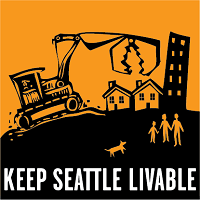1. Request an extension: MHA DEIS
The Draft Environmental Impact Statement (DEIS) evaluates the Mandatory Housing Affordability (MHA) program impacts in Urban Villages, and in multi-family and commercial areas throughout Seattle. It presents three alternatives. The first alternative is to not do the MHA Upzone program. The second appears to be an expanded variation of what was presented at the end of the HALA Focus Groups and in the Urban Village Workshops. The third alternative presented is brand new, and is not based on discussions with the HALA Focus Groups or the Urban Village Design Workshops.
Please request to extend the MHA DEIS comment period! Released on June 8, 2017, the DEIS is 462 pages long and the appendices are 364 pages long. This is over 800 pages to review within only 32 days.
Please send your request to: MHA.EIS@seattle.gov, as well as to the City Council by phone, 206-684-8888, and/or by email: Lisa Herbold, Bruce Harrell, Kshama Sawant, Rob Johnson, Debora Juarez, Mike O’Brien, Sally Bagshaw, Tim Burgess, Lorena González.
Please submit your request to Mayor Murray:
http://www.seattle.gov/mayor/get-involved/contact-the-mayor
These documents may be viewed or downloaded from the City’s MHA Environmental Impact Statement website, or from copies in the EIS folder on the Wallingford Community Council (WCC) website. These are large documents! The main document is 50 MB, and the appendices are 95 MB.
2. Public Hearing: MHA DEIS
Attend the Public Hearing on the DEIS on Thursday June 29, 5:30 PM at Seattle City Hall. Open House at 5:30 PM; Public Hearing starts at 6:30 PM.
- Request an extension to the MHA DEIS comment period.
- Ask for clarifications on MHA issues.
- Share your concerns on MHA impacts.
3. Submit comments: Design Review Process “Improvements”
Please comment on the proposed Design Review Process “Improvements” by Monday July 10, 5:00 PM.
Ask the Land Use Planner and all Council members to:
- Leave the Design Review Process as is.
- Direct city employees and the Design Review Boards to enforce existing design guidelines.
Growth without Oversight: Without the check and balance of inclusive design review, growth can destroy neighborhoods. With it, the character and quality of the neighborhood is strengthened when adding housing and commercial spaces.
Click here for WCC call-to-action and contact information for comments.


